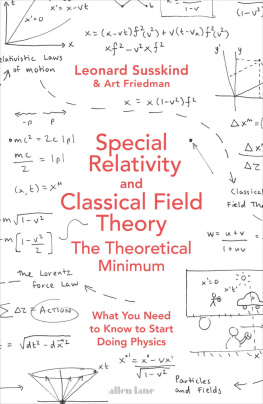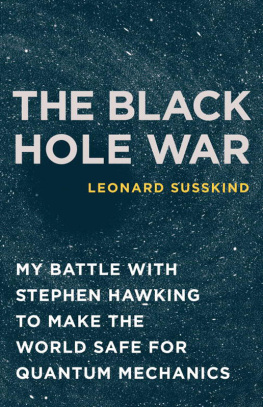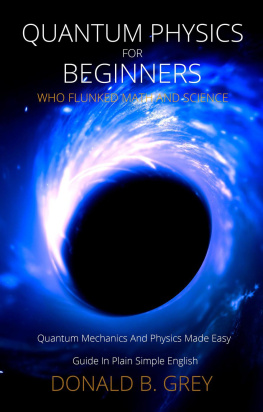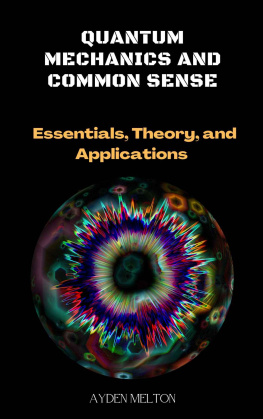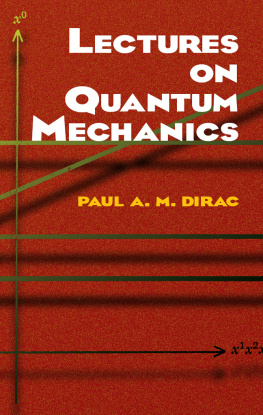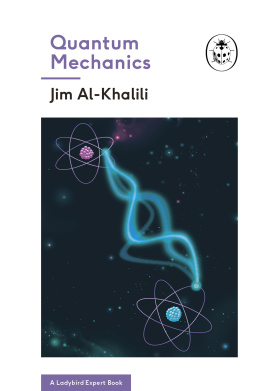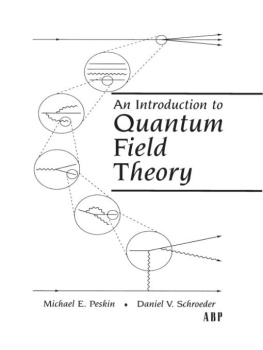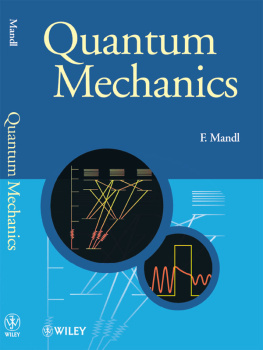Praise for Quantum Mechanics
While its definitely a book for people who have some math background, it doesnt require much and it unspools the basics slowly, thoughtfully and with exceptional clarity.
Adam Frank, NPRs 13.7 blog
If youre ever banished to a desert island and allowed to take just one book, here it is. Given enough time, with no distractions, you could use it to eventually master quantum mechanics.... [E]ven without mastering all the calculational complexities, a careful read at the very least offers deeper insight into the logic and mathematical substance of quantum physics than youll get from any popular account.
Science News
[Quantum Mechanics] provides you with the minimal equipment you need to understand what all the fuzz with quantum optics, quantum computing, and black hole evaporation is about.... If you want to make the step from popular science literature to textbooks and the general scientific literature, then this book series is a must-read.
Back Reaction
[V]ery detailed but very well written.
San Francisco Book Review
The writing is fresh and immediate, with plenty of detail packaged into the smooth narrative.... [O]n their own terms, I found Susskind and Friedmans explanations crisp and satisfying.... I maintain a clear recollection of the bewilderment with which I struggled through my own university quantum-mechanics courses. For students in a similar position, trying to draw together the fragments of formalism into a clear conceptual whole, Susskind and Friedmans persuasive overviewand their insistence on explaining, with sharp mathematical detail, exactly what it is that is strange about quantum mechanicsmay be just what is needed.
David Seery, Nature
[Quantum Mechanics] is even better than the first volume, taking on a much more difficult subject.... The Theoretical Minimum phrase is a reference to Landau, but its a good characterization of this book and the lectures in general. Susskind does a good job of boiling these subjects down to their core ideas and examples, and giving a careful exposition of these in as simple terms as possible. If youve gotten a taste for physics from popular books, this is a great place to start learning what the subject is really about.
Peter Woit, Not Even Wrong
[T]he book will work well as a companion text for university students studying quantum mechanics or the armchair physicists following Susskinds YouTube lectures.
Publishers Weekly
Either for those about to start a university physics course who want some preparation, or for someone who finds popular science explanations too summary and is prepared to take on some quite serious math... its a fascinating addition to the library.
Popular Science (UK)
This is quantum mechanics for real. This is the good stuff, the most mysterious aspects of how reality works, set out with crystalline clarity. If you want to know how physicists really think about the world, this book is the place to start.
Sean Carroll, physicist, California Institute of Technology, and author of The Particle at the End of the Universe
This book is the second volume of the Theoretical Minimum series. The first volume, The Theoretical Minimum: What You Need to Know to Start Doing Physics, covered classical mechanics, which is the core of any physics education. We will refer to it from time to time simply as Volume I. This second book explains quantum mechanics and its relationship to classical mechanics. The books in this series run parallel to Leonard Susskinds videos, available on the Web through Stanford University (see www.theoreticalminimum.com for a listing). While covering the same general topics as the videos, the books contain additional details, and topics that dont appear in the videos.
QUANTUM
MECHANICS
Also by Leonard Susskind
The Theoretical Minimum
What You Need To Know to Start Doing Physics
(with George Hrabovsky)
The Black Hole War
The Cosmic Landscape
QUANTUM
MECHANICS
The Theoretical Minimum
LEONARD SUSSKIND
and ART FRIEDMAN
BASIC BOOKS
A Member of the Perseus Books Group
New York
Copyright 2014 by Leonard Susskind and Art Friedman
Published by Basic Books,
A Member of the Perseus Books Group
All rights reserved. No part of this book may be reproduced in any manner whatsoever without written permission except in the case of brief quotations embodied in critical articles and reviews. For information, address Basic Books, 250 West 57th Street, 15th Floor, New York, NY 101071307.
Books published by Basic Books are available at special discounts for bulk purchases in the United States by corporations, institutions, and other organizations. For more information, please contact the Special Markets Department at the Perseus Books Group, 2300 Chestnut Street, Suite 200, Philadelphia, PA 19103, or call (800) 8104145, ext. 5000, or e-mail .
Designed by Art Friedman and Leonard Susskind
Hilberts Place drawings were created by Margaret Sloan.
A CIP catalog record for this book is available from the Library of Congress.
ISBN (ebook): 978-0-465-08061-8
ISBN (paperback): 978-0-465-06290-4
10 9 8 7 6 5 4 3 2 1
For our parents, who made it all possible:
Irene and Benjamin Susskind George and Trudy Friedman
Albert Einstein, who was in many ways the father of quantum mechanics, had a notorious love-hate relation with the subject. His debates with Niels BohrBohr completely accepting of quantum mechanics and Einstein deeply skepticalare famous in the history of science. It was generally accepted by most physicists that Bohr won and Einstein lost. My own feeling, I think shared by a growing number of physicists, is that this attitude does not do justice to Einsteins views.
Both Bohr and Einstein were subtle men. Einstein tried very hard to show that quantum mechanics was inconsistent; Bohr, however, was always able to counter his arguments. But in his final attack Einstein pointed to something so deep, so counterintuitive, so troubling, and yet so exciting, that at the beginning of the twenty-first century it has returned to fascinate theoretical physicists. Bohrs only answer to Einsteins last great discoverythe discovery of entanglementwas to ignore it.
The phenomenon of entanglement is the essential fact of quantum mechanics, the fact that makes it so different from classical physics. It brings into question our entire understanding about what is real in the physical world. Our ordinary intuition about physical systems is that if we know everything about a system, that is, everything that can in principle be known, then we know everything about its parts. If we have complete knowledge of the condition of an automobile, then we know everything about its wheels, its engine, its transmission, right down to the screws that hold the upholstery in place. It would not make sense for a mechanic to say, I know everything about your car but unfortunately I cant tell you anything about any of its parts.
But thats exactly what Einstein explained to Bohrin quantum mechanics, one can know everything about a system and nothing about its individual partsbut Bohr failed to appreciate this fact. I might add that generations of quantum textbooks blithely ignored it.
Everyone knows that quantum mechanics is strange, but I suspect very few people could tell you exactly in what way. This book is a technical course of lectures on quantum mechanics, but it is different than most courses or most textbooks. The focus is on the logical principles and the goal is not to hide the utter strangeness of quantum logic but to bring it out into the light of day.


